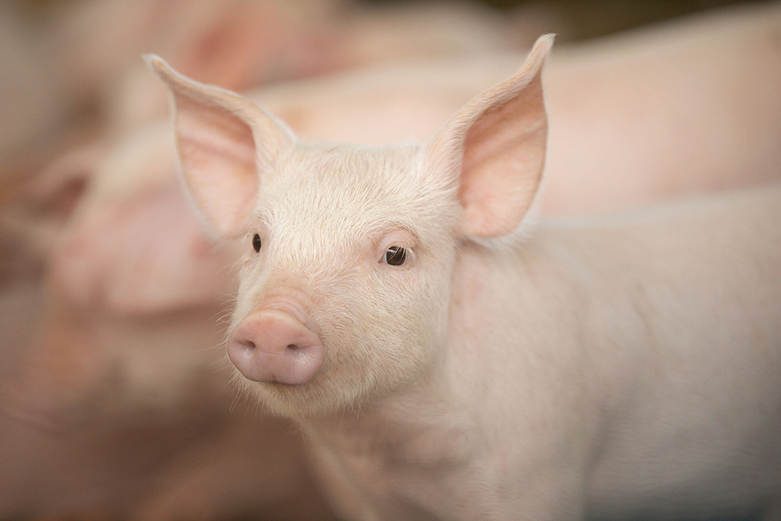Determination marks a critical milestone in the battle against the PRRS virus
HENDERSONVILLE, Tenn. (Oct. 5, 2023) – Genus plc (LSE: GNS), the parent company of PIC (Pig Improvement Company), announced today that Colombia’s government issued a favorable regulatory determination for gene-edited pigs resistant to the Porcine Reproductive and Respiratory Syndrome (PRRS) virus. This means Colombia will treat the PRRS-resistant pigs the same as conventionally bred pigs.
It is important to note this determination will not automatically trigger sales of PRRS-resistant pigs in Colombia. PIC is working closely and transparently with all stakeholders in the animal protein value chain to establish a timeline for commercialization.
“For more than 30 years, pork producers have struggled to protect their pigs from the devastating PRRS virus. PIC is working to make the PRRS-resistant pig and genetics available to producers across the globe to improve animal welfare and the sustainability of pork production,” said Matt Culbertson, Chief Operations Officer at PIC. “Today’s announcement marks a critical milestone in the battle against PRRS and it moves PIC one step closer to commercializing the PRRS-resistant pig.”
The PRRS virus is a universal challenge affecting pork producers and production systems worldwide. It is estimated that PRRS costs the global pork industry approximately $2 billion1 each year. PIC is working to secure approval for the PRRS-resistant pig in the United States, Canada, China, Japan, Mexico, and Brazil along with other pork-producing countries. Each country has a unique regulatory system and biotechnology policies that will affect the approval process and timeline. PIC anticipates a series of regulatory decisions over the next few years including a decision from the United States Food and Drug Administration in the first half of 2024.
In addition to securing key approvals, other considerations will determine when PIC will initiate a phased global launch. As with any genetic improvement, it will take several years to multiply enough PRRS-resistant genetics to meet global demand.
Using Gene Editing to Protect Pigs from the PRRS Virus
Gene editing is making headlines because of its successful human healthcare applications. The technology shows tremendous potential to help treat and prevent human diseases, including HIV, sickle cell anemia and a variety of cancers, according to the World Health Organization2. Gene editing can be used to provide similar disease-resistance benefits to improve animal health.
PIC developed a solution to protect pigs from the PRRS virus, which causes animal suffering and prematurely kills millions of pigs per year. Using gene editing technology, PIC deleted a small portion of the pig’s DNA that encodes a protein that the virus uses to enter and infect the pigs’ cells. Without the binding site, the PRRS virus is unable to enter the cell, replicate and infect the pig.
Adopting the PRRS-resistant pig can also have secondary benefits, including improving the overall health of the herd and the sustainability of the production system. Research shows the PRRS virus makes pigs more susceptible to secondary infections3. If herds can eliminate PRRS infections, pigs will have less need for antibiotic use4, which reduces producers’ input costs and supports antimicrobial stewardship. It can also reduce the physical, mental and emotional strain on workers resulting from a PRRS outbreak.
Genetic Improvements Support Sustainable Protein Production
PIC has over a 60-year legacy of providing genetic improvements in pigs. Gene editing allows PIC to accomplish genetic improvements — similar to those achieved through traditional breeding — faster.
Advanced genetics produce healthier animals. Healthy pigs typically consume feed5 and water6 more efficiently than pigs battling disease, which may reduce waste, carbon emissions and production costs. That, in turn, helps make farms and pork production more sustainable. PIC is working with credible, third-party researchers to conduct a Lifecycle Analysis to quantify these benefits and will share the research findings later this year.
Please monitor picprrsresistantpig.com for regulatory announcements, commercialization plans and research specific to the PRRS-resistant pig.
ABOUT PIC
PIC (Pig Improvement Company) is the global leader in swine genetics. PIC provides genetically superior breeding stock to pig producers and supports them with technical services to help them realize genetic potential. PIC is a subsidiary of Genus, a UK-based company with a vision to pioneer animal genetic improvement to help nourish the world. For more information on PIC, visit PIC.com.
Citations
[1] Xavier de Paz, “PRRS cost for the European swine industry” Pig.333.com, 17 August 2015. https://www.pig333.com/articles/prrs-cost-for-the-european-swine-industry_10069/; Holtkamp DJ, Kliebenstein JB, Neumann EJ, et al. “Assessment of the economic impact of porcine reproductive and respiratory syndrome virus on United States pork producers” J Swine Health Prod. 2013;21(2):72-84.
2 “WHO issues new recommendations on human genome editing for the advancement of public health.” July 12, 2021.
3 Zhao D, Yang B, Yuan X, Shen C, Zhang D, Shi X, Zhang T, Cui H, Yang J, Chen X, Hao Y, Zheng H, Zhang K, Liu X. Advanced Research in Porcine Reproductive and Respiratory Syndrome Virus Co-infection With Other Pathogens in Swine. Front Vet Sci. 2021 Aug 26; 8:699561. doi: 10.3389/fvets.2021.699561. PMID: 34513970; PMCID: PMC8426627.
4 Dee S, Guzman JE, Hanson D, Garbes N, Morrison R, Amodie D, et al. (2018) A randomized controlled trial to evaluate performance of pigs raised in antibiotic-free or conventional production systems following challenge with porcine reproductive and respiratory syndrome virus. PLoS ONE 13(12): e0208430.
5 Schweer W, Schwartz K, Patience JF, Karriker L, Sparks C, Weaver M, Fitzsimmons M, Burkey TE, Gabler NK. Porcine Reproductive and Respiratory Syndrome virus reduces feed efficiency, digestibility, and lean tissue accretion in grow-finish pigs. Transl Anim Sci. 2017 Dec 1; 1(4):480-488. doi: 10.2527/tas2017.0054. PMID: 32704671; PMCID: PMC7204981.
6 Nejsum Madsen, Thomas, and Anders Ringgaard Kristensen. “A Model for Monitoring the Condition of Young Pigs by Their Drinking Behaviour.” Computers and Electronics in Agriculture, vol. 48, no. 2, 2005, pp. 138–154, https://www.sciencedirect.com/science/article/pii/S0168169905000475.
Media Contacts
Keely Coppess, keelyc@lookeast.com
Francisca Ramírez, Francisca.Ramirez@genusplc.com






